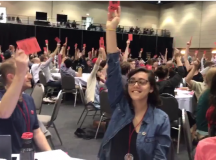Jacob Dallal reflects on his five-years working at the Ministry of Strategic Affairs from 2016 to 2021 to defend Israel’s legitimacy from a small but growing minority in the West calling it into question. His thoughts are timely as the ministry is set to be reconstituted, and the task of countering the global effort to delegitimise Israel is set to become part of an enlarged Ministry of Diaspora Affairs. In a context marked by a growing number of young Jews renouncing Israel, not least in the United States, Dallal sets out proposals for tackling the challenge: to engage with Jews giving up on Israel, to use the fact that the anti-Israel movement divides into two groups by motivation, one arguably antisemitic and one not, and to develop a better, more compelling, more contemporary national narrative of a Jewish homeland.
It was early evening when a colleague passed by my office and asked me to comment on a document he had written. He explained that the document had already been approved and sent to the Minister, but he would appreciate anything I could add. It was October 2018, and the title of the memo was ‘Recommendation for Refusing Entry to Lara Alqasem.’
During the subsequent two weeks the American student’s name would be all over the international news, as Israel would bar her entry on the grounds that she was a BDS supporter, only to have the decision overturned by Israel’s Supreme Court.
It was a tumultuous two weeks, part of a tumultuous five years, from 2016 to 2021, during which the Ministry of Strategic Affairs, a small Israeli government ministry where I worked, led Israel’s efforts to counter the delegitimisation of Israel, spearheaded by the BDS movement.
Soon after the formation of the Bennet-Lapid government in June 2021, the ministry closed. Its budget, employees, office space, along with the portfolio for countering delegitimisation was all incorporated into Israel’s Ministry of Foreign Affairs. Back in the hands of the veteran Foreign Ministry diplomats, things have returned to what Israelis term ‘industrial quiet’: no big headlines or pronouncements by the minister, no glossy reports with in-your-face social media campaigns; the issues are being dealt with in a quieter, lead-from-behind approach.
This will all change again as the new Benjamin Netanyahu-led government assumes the reins of power. The Ministry of Strategic Affairs will be reconstituted under Minister Ron Dermer, former Israel Ambassador to the United States and Netanyahu confidant, focusing on expanding and enhancing the Abraham Accords. The portfolio on combatting the delegitimisation of Israel will now likely become part of an enlarged Ministry of Diaspora Affairs. Details, true to Israeli form, are up in the air.
Still, the tumult provides an opportunity to reflect on that five-year period when I worked at the Ministry of Strategic Affairs, now with a little perspective. And specifically, to reflect on the question of what can a country, whose legitimacy is being called into question by a small but growing minority in the West, do to fend off this attack.
NO-ONE KNOWS WHAT TO DO
I joined the Ministry of Strategic Affairs in the fall of 2016, as part of the hiring drive. US-born and educated, and having lived some 15 years in Israel, I saw joining the ministry as an opportunity to join the government in an area where the Israeli establishment is weakest: in fighting a ‘soft war’ taking place against it in the West.
I was no stranger to the Israeli establishment and its public diplomacy efforts. I had served as an officer for five years in the IDF spokesperson’s Unit, including as acting head of the international press office during the Second Lebanon War in 2006. I began working at the Ministry a decade later as a sceptic: not of the need for the Israeli establishment to recognise that there was a growing movement in the West trying to undermine its legitimacy and it might consider doing something about it, but of the ability of a government ministry to take on an international civil society campaign.
At the same time, I don’t think people appreciate the uniqueness – some might say absurdity or injustice – of the situation in which a country devotes the resources of a government ministry to defending its legitimacy to exist.
The Ministry was headed by Gilad Erdan, a staunchly right-wing Likud minister, today Israel’s ambassador to the UN, who was formally tasked with leading the government’s effort to counteract the delegitimisation of Israel in an October 2015 cabinet decision. His mantra was ‘from defence to offence’ or, in other words, instead of Israel being attacked by haters, let’s attack the haters.
So we began. To be honest, we didn’t know precisely what to do; no-one who had worked on this issue had been able to come up with a silver bullet or quick fix. So, we did a lot of things. The ministry funded organisations that were working to strengthen Israel’s image and counter BDS; we founded and funded a public benefit company, to fund projects supporting and empowering the global pro-Israel community.
The ministry researched the links of these BDS-promoting NGOs, specifically those operating in the West Bank and Gaza, with terrorist organisations (in a major report ‘Terrorists in Suits’) and European government funding of BDS-promoting NGOs in general and those with links to terror organisations in particular. These efforts exerted additional pressure on European governments which slowly began curtailing funding to those NGOs. Later, we focused on the connection between BDS and antisemitism, a report with which I was heavily involved.
One might think that with these and many other varied efforts, and with all the collective experience and takeaways of the pro-Israel community, there would be a clear path forward. To this day, there isn’t. To be clear, the work of the 150-some pro-Israel NGOs around the world is critical – but it’s hard to say in real time what will succeed and what won’t. Thanks to an initiative led by a few, pro-Israel NGOs, there are now anti-BDS laws in a majority of states in the US, laws which proved critical in thwarting or undermining two of the most important BDS efforts in recent years – the Ben and Jerry’s and Airbnb declared boycotts of Jewish residents of the West Bank. The other side works the same way – through trial and error and plodding on.
All the same, at a conference in Tel Aviv in November hosted by the Institute for National Security Studies (INSS) and the Reut Institute on the US-Israel relations, Sima Vaknin-Gil, who served as director general of the Ministry during this period, said there is clear problem with no clear solution. The furthest the panel, composed mostly of Israeli security experts, could come was to suggest the Israeli government set up a unit within the Prime Minister’s Office to tackle the problem…
A PROBLEM WITHIN A PROBLEM: THE JEWS
Like many people involved in the pro-Israel space, I had heard a lot, but knew factually little, about the BDS movement. The disturbing scenes on campuses in the US or the UK could leave one with the impression that this was a group of campus students (and extremist left-wing professors), including some of Palestinian or Arab origin, fighting for what they perceived as a just cause. Early on, the Ministry published a map of the leading NGOs around the globe advocating the boycott of Israel. We found an international network – not just a local nuisance – led by the Ramallah-based Palestinian BDS National Committee (BNC) and Palestinian Academic and Cultural Boycott of Israel (PACBI), both an outgrowth of the notorious 2001 UN Conference Against Racism in Durban which breathed life into the notion that Israel, like Apartheid South Africa, should be pressured into submission through international boycott. The BDS National Committee sets the agenda for the BDS network worldwide; it even comes up with the annual logo for Apartheid Week. It is led by Omar Barghouti, a Qatari-born, US and Israeli-educated activist with Palestinian roots, who unequivocally denies the right of Jews to a state in Palestine ‘within any borders.’ This isn’t a group of high-minded students seeking justice for the disenfranchised Palestinian people. This is a Palestinian-led effort to undermine the State of Israel.
The one geographic group missing from the map are the BDS-promoting NGOs in Israel. As a government ministry, we were restricted from doing any research on Israeli NGOs or individuals. Thus, a more accurate version of the ministry’s research would have included NGOs based in Israel, like the Haifa-domiciled ‘Who Profits?’ which contributed critical research for the UN High Commissioner for Human Rights blacklist of Israeli companies doing business in the territories and to the anticipated International Court of Justice’s legal opinion on Israel’s ‘prolonged occupation, settlement and annexation of Palestinian territory.’
Generally, I believe people don’t realise (or simply downplay) the profound role Israelis had in laying the groundwork for the delegitimisation of Israel and, by extension, for the claims made today by the BDS movement. For example, it was Israeli scholars at Israeli and UK universities (Ilan Pappe is a notorious example) whose academic research underpinned the narrative of Israel as guilty of colonialism and ethnic cleansing. More recently, last year’s B’Tselem report, ‘A Regime of Jewish Supremacy from the Jordan River to the Mediterranean Sea: This Is Apartheid’, spearheaded the way for similar reports by Amnesty International and Human Rights Watch. If a respected Israeli NGO (and, separately, a former Attorney General of the State of Israel) says Israel is an apartheid regime, what more validation does one need?
I liked to say that the work against the delegitimisation of Israel and BDS begins at home – and that before preaching its ills to the world, we ought to make an effort to grapple with and do some soul-searching regarding the Israeli contribution to this phenomenon. Save for a few far-right organisations, the subject is almost taboo in Israel. I suspect it is simply too difficult a conversation for Israelis to have. If attempted, such a discussion almost immediately devolves into an argument over Israeli policy in the West Bank and Gaza, rather than tackling more fundamental questions such as what gives Jews the right to a State anywhere in Israel or, if the Palestinian conflict were resolved, would any arguments against Israel’s legitimacy hold? (But of course it is easier to cry gevalt over some student council resolution on an Ivy League campus condemning Israel or say all BDS supporters are antisemitic and call it a day.)
Still, within Israel, the delegitimisation of Israel and/or support for BDS remains extremely marginal. In the United States, on the other hand – home to the largest and most important diaspora population today – the question of whether Israel is a legitimate entity is no longer relegated to the extremist margin.
A July 2021 survey of US Jewish voters found 22 per cent agreed that Israel was committing genocide against the Palestinians and 25 per cent said Israel is an apartheid state. Among voters under 40, one third agreed Israel was committing genocide and 9 per cent thought Israel does not have a right to exist. The delegitimisation of Israel is mainstreaming in the US, Israel’s foundational strategic ally – within the Jewish community, from the fringe left to many young Jewish progressives, and within society at large, from the campus to the floor of the US Congress.
One of the groups spearheading that attack in the United States, and arguably the single most capable BDS-promoting NGO in the United States, is Jewish Voice for Peace. Established in the 1990s as a fringe left Jewish organisation, today it boasts 70 chapters around the country and has recently set up a lobbying arm in Washington DC. Its campus chapters partner with Students for Justice in Palestine, jointly sponsoring BDS resolutions in student government. There are similar, but more marginal, Jewish-led BDS-promoting NGOs in Europe, such as ‘Jüdische Stimme für gerechten Frieden in Nahost’ (‘Jewish Voice for Just Peace in the Middle East’) in Germany and ‘Union Juive Francais Pour La Paix’ (‘Jewish French Union for Peace’) in France.
In grappling with this growing trend, one needs to consider that what brings a Jew to delegitimise Israel is very different than what brings a non-Jew. For a person of Arab, and certainly of Palestinian, lineage, an antipathy to Israel is almost obvious: since Israel has always been perceived as the enemy and pariah in the Middle East, the cause of Palestinian affliction, delegitimising Israel is obvious and the call for a boycott of Israel offers a way to bring the country down through legitimate, non-violent means. Likewise, for a non-Jew, Israel can easily be construed as a colonialist occupying power and therefore deserving of sanction.
But for a Jew (abroad or in Israel), the repudiation of Israel stems from something deeper. It begins, as I see it, with moral and psychological angst over Jewish sovereignty and the responsibilities that come with it – like having an army, where Jewish soldiers kill people (who want to kill them) and sometimes, mistakenly, kill innocent people. It gets especially strained by the complexity and moral issues around the half-century of internationally condemned ‘occupation.’ Add to that the lack of movement on the Palestinian issue and rounds of war in Gaza with numerous Palestinian civilian casualties, and you have the perfect storm for a full reassessment by many progressive Jews of their relation to Israel.
If that internal angst isn’t enough, consider the external pressures reaching a boiling point today in America on the subject of racism, which is purposefully and wrongly superimposed on the Israeli-Palestinian conflict (which, in fact, isn’t a racist conflict strictly speaking, but a religious-ethno-nationalist conflict, the likes of which there are no shortage of around the world). This dishonest portrayal of Israel as particularly racist, exacerbated by buzz words like colonialism, oppression, police brutality and ethnic cleansing – all coopted from their original contexts and applied to Israel – coupled with the uncompromising approach of the far left in which you either renounce any allegiance to Israel or you cannot call yourself progressive, is putting more and more young American Jews in a catch-22.
This external societal pressure coupled with the pre-existing internal reassessment of Israel, often leads to a calamitous result: a growing number of young Jews are renouncing Israel – some with a passion.
WHAT TO DO (1): TALK TO CONCERNED JEWS
During the conflict with Gaza in May 2021, some 90 rabbinical students, representing a significant portion of students who are enrolled in America’s non-Orthodox rabbinical schools, signed an open letter accusing Israel of ‘violent suppression of human rights.’ They wrote: ‘Our political advocacy too often… supports violent suppression of human rights and enables apartheid in the Palestinian territories.’
This letter was not written by the BDS movement or Israel-bashers but by idealist Jews who will become the spiritual leaders of non-Orthodox Jewry in America. It is full of the angst described above. Critically, they show no fundamental animus to the Jewish State, but they do espouse a worldview that enables a delegitimising of Israel which, in time, may erode consensus around Israel’s fundamental legitimacy and right to exist.
This is not an isolated problem, but a fast-growing challenge – both for the Jewish world and for Israel. Yet Israelis have little idea of the angst young American Jews are suffering and the difficult position they find themselves in on when confronted with the issue of Israel. Young American Jews don’t fully understand the wider, deeper Jewish Diaspora experience because their only experience is that of living alongside a stable, secure and prosperous Jewish State, no longer in danger of annihilation. Only their grandparents or great grandparents, if they are still alive, know of the Jewish Diaspora experience in the absence of a Jewish State which serves as a refuge of last resort – and that Diaspora experience is a much more precarious one.
I think the best place to start is for Israel (both government and NGOs) to engage with Jews who are sympathetic to BDS, but not yet quite on-board. Discuss tough issues like Jewish sovereignty, nationalism, Zionism, and see where it goes. And as we begin to take these issues apart together, the internal pressure described above will hopefully begin to ease. American progressive Jews will also find Israeli counterparts who agree totally with their arguments in principle, but – hardened by the reality of living on the ground in the Middle East – might be able to offer the realisation that life, like statecraft, is sometimes a judicious compromise between principle and reality, and that this too is a price to be paid for Jewish sovereignty.
A good place to intensify this dialogue is with those same non-Orthodox rabbinical students during the year of their studies spent in Israel. The Ministry of Diaspora Affairs in the outgoing government has launched important initiatives in this regard.
Israel’s most pressing problem regarding countering the growing effort to delegitimise it is, ironically, a Jewish problem. If we don’t get our house in order, it will likely lead to an internal schism. Moreover, if a majority of the US public and US Jewry are unsympathetic to Israel, that is likely to have negative implications for the US-Israel strategic alliance.
So now is the time to make a vigorous effort. And I say this even if it is going to be significantly more difficult given the new government in Israel.
In that way, it is ironically fitting that the Ministry of Diaspora Affairs take on the delegitimisation portfolio, but not for the reason the government thinks – that delegitimisation is an assault on the Jewish People and a corollary to antisemitism. While that may be true, the ultimate threat from delegitimisation is that it serves as the wedge issue which will bring about a schism between Israel and Diaspora Jewry and, within Diaspora Jewry, between pro- and anti-Israel voices. And here is where the Government of Israel and the Ministry ought to lead in a spirit of conciliation and rapprochement, not in a self-righteous attitude of ‘we are right and they are misguided.’
For those who think otherwise, it bears remembering that the last time Jews lost control over the Land of Israel over 2,000 years ago it was in no small part the product of internal Jewish infighting and discord.
WHAT TO DO (2): UNDERSTAND THE ANTI-ISRAEL CAMP IS DIVIDED BY WHAT MOTIVATES ITS MEMBERS
A key to understanding and countering the anti-Israel and the BDS movement is to understand that its supporters are divided by their motivation into two groups. It also brings clarity to the muddled issue of antisemitism and BDS.
The first group consists of the BDS founders and leading activists, who want to see an end to the Jewish State in its current form. Boycott, divestment and sanction are a means to this end. Asked by the New York Times if ‘Jews can have their own state’, BDS founder Barghouti responded pointedly: ‘Not in Palestine.’
But there is another group among BDS proponents and sympathisers who do not see the end to the Jewish State as a goal at all. This group believes that boycotts are a legitimate means of political pressure on the government of Israel to change its policies and relationship with the Palestinians. ‘We… remain today, supporters of the State of Israel,’ Bennett Cohen and Jerry Greenfield, founders of Ben and Jerry’s ice cream, wrote in an op-ed, explaining why they believe their company’s decision to boycott is justified. ‘It’s possible to support Israel and oppose some of its policies,’ they argue. In fact, they would argue that they are being pro-Israel, not anti-Israel, by supporting the BDS movement. Needless to say, this group is not antisemitic.
Thus, the real question to ask is not whether one supports a boycott of Israel but rather whether one believes in the right of the Jews to a Jewish State anywhere in current-day Israel.
But this critical question of whether Israel should exist as a Jewish State gets muddled in the question of whether or not to boycott it. For the BDS movement leadership, having nice Jewish progressives like Ben and Jerry speak in favor of boycott strengthens the BDS brand and shields it from accusations of nefarious intent and antisemitism. For the Israeli government and the pro-Israel community, any boycott of any part of Israel is unacceptable – regardless of the intent. (Indeed, boycott is a slippery slope and once you go down it you don’t know, literally, where to draw the line. When you say boycott the territories does that include the Old City of Jerusalem, which is also beyond the Green Line? Not to mention that the concept of boycotting Jews revives terrible historical trauma.)
But if we hold with the question ‘does Israel have a right to exist as a Jewish State’ and find the answer to that question is yes (as it is for the second group of BDS supporters and sympathisers), then one can argue whether a boycott is the most effective means of getting Israel to change its policies. (The answer is that it is probably the worst and least effective means, putting all Israelis on the defensive.) If the answer is no (the hard core BDS activists), that begs the unavoidable question: if the French have a right to France as their national home, the Turks to Turkey as theirs, the Palestinians to Palestine as their, etc., why not the Jews? Why are the Jews uniquely denied the right to self-determination and a sovereign state of their own? And here is where questions of moral double standard – and new antisemitism – come into play.
This question of the right of Jews to a Jewish State may be uncomfortable to discuss in a post-nationalistic West. It may even be hard for progressive Jews to swallow. But it is the heart of the matter and should be raised and vigorously discussed – especially now, when there is still international consensus and support for this proposition in the US and Europe.
Focusing on this issue also clarifies when it may be relevant to discuss antisemitism and when it is clearly not, and may create a small but important fissure within the BDS camp , drawing a divide between the Omar Bargouhtis and the Ben and Jerrys, between those who want to see an end to the Jewish State and those who want to pressure Israel to change its politics. (It may even expose a rift between the likes of Yousef Munayyer and Peter Beinart, who take the same side of the debate on a one state solution – the former denying the Jews any right to a state anywhere in current-day Israel, the latter saying only that it is not viable given the current circumstances, but not rejecting the right in principle).
WHAT TO DO (3): DEVELOP A STRONGER NARRATIVE OF OUR OWN: HOME
I mentioned earlier the mantra: from defence to offence. In other words, go on the offensive in fighting the bad guys. But, in its essence, fighting the anti-Israel camp is still playing defence. And it isn’t necessarily the wisest allocations of resources, since you are expending your energy fighting the people who want your demise.
What about engaging all the people who don’t?
This is not going to lead me to argue just that we need to make friends and alliances – all of that is good and true.
What I wish to say is that Israel has a much more fundamental problem in its forced-upon quest for legitimacy: its narrative.
The Palestinians side have a clear, cogent narrative: end the occupation, we seek freedom and justice. The anti-Israel camp simply repurposes this to an anti-Israel narrative: Israel is an occupier, colonialist, apartheid – and thus illegitimate – regime.
In this war of narratives, what is Israel’s narrative?
Before and after the founding of the State that narrative was resounding: after 2,000 years of exile, the Jewish people were building a state in their ancestral home. It inspired Jews in Israel, Jews abroad, and, more broadly, people the world over.
Seventy years on and that dream secured, what do we Israelis aspire to?
I liked to say that instead of working ‘to counter delegitimacy’ we should work to ‘enhance Israel’s legitimacy’ – and the key to that is a compelling, contemporary national narrative. With the fractures in Israeli society, this will be a challenge, but not an insurmountable one.
Moreover, Israel’s foundational narrative around the rebirth of the State as the home of the Jewish People is not defunct. It still inspires us; we still believe in it; it is an ongoing project – incomplete. We just need to take it ‘to the next level’ and make it more relevant to where we are now within that story; call it a 2.0 version. Also, a narrative is not a foundational document or a basic law where, true to form, everyone will argue over every word. It is the outline of a story, the contours of collective aspiration, and each person will (and should) tell it slightly differently. We just have to agree upon the basic elements.
If the founding narrative was that Israel was the home of the Jewish people and the Jews were re-establishing that national home – we have a motif that may work around building/re-building that narrative in its 2.0 version: home.
Even today, in 2022, the cliché ‘there’s no place like home’ has special resonance for Israelis. Perhaps the most iconic branding in Israel is for, of all things, cottage cheese (by Israel’s leading dairy company, Tnuva). It is a sketch of a home, with a tree next to it. Not a particularly Israeli home, very generic.
This simple generic sketch evokes among any Israeli a gush of emotions and associations. One might imagine a soldier coming home for the weekend, of cooking on Friday, of kids running around, or friends getting together for a barbeque, of idyllic life on a kibbutz or moshav.
Israelis have an uncanny relation to the land. If one lives abroad, and visits a national park or takes a car trip – one awes at the power of nature or the vastness or beauty of the landscape. In Israel, this emotion feeds directly into that sense of place, of home and belonging, and of pride (‘wow we live in an amazing country’); in some it also evokes religious/historical associations (‘this is the land of our forefathers’).
This strong sense of place is felt by the non-Jewish residents of Israel as well, even if they don’t feel a connection to the reclamation of the Jewish homeland.
In a word (or in a slogan): ‘This is my home’ says a lot. (In Hebrew, in the words of the classic song ‘I have no other country’, this would best be rendered, כאן ביתי).
‘This is my home’ conveys a connection to the place and to the land and a sense of belonging. It is general enough that every Israeli, no matter his or her background, can say it and mean it. From there, each Israeli will take their description of home in a different direction; and part of it – perhaps even a large part – may be anguished and pained. That’s OK. Because the impression that one leave with from all the individual descriptions of ‘this is my home’ is that these people really have a strong connection to this place. They really feel this is their home. That, in today’s world of 140 characters and TikTok videos, conveys a lot; and it conveys something deep. Jews abroad will easily be able to relate to it; as will people around the world because home is such a fundamental and relatable concept.
Finally, and, frankly, least importantly, it is also speaks to the delegitimisers because it conveys an implicit confidence of Israelis that this place is theirs. And I say least importantly because what matters is that we Israelis need a unifying narrative first and foremost for ourselves, and then, by extension, for the Jewish People. What the world will think of it matters a lot less.
In short, this is precisely the discussion which Israelis and the pro-Israel world trying to fend off attacks on Israel’s legitimacy should be having. It is certainly more constructive than the many speeches and conferences devoted to (bemoaning) Israel’s image and its ‘hasbara.’
In Proverbs it says, ‘Where there is no vision, the people become unruly.’ I would paraphrase that relevant to this discussion: ‘where there is no narrative, the people won’t win an attack on their legitimacy.’






































